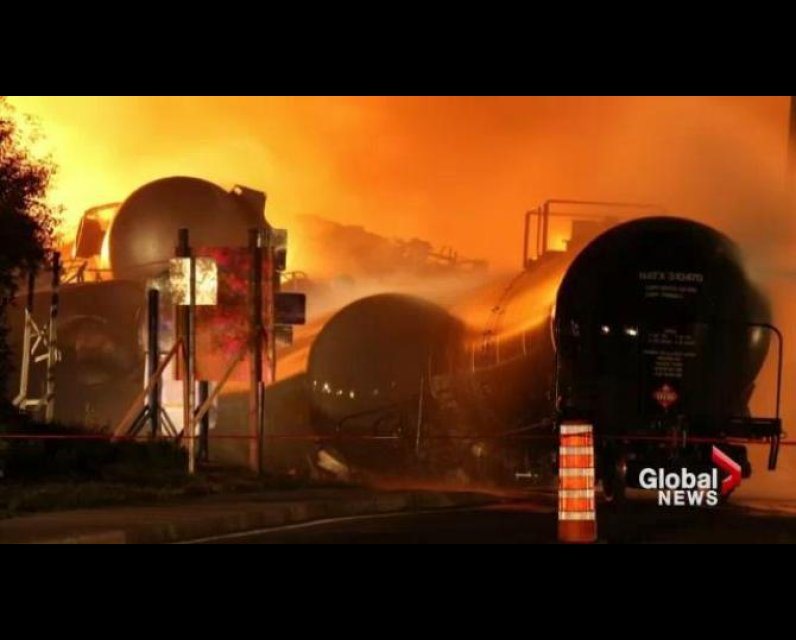Unpublished Opinions
Unpublished.ca is a web portal on politics and current affairs in Canada. It provides the opportunity for Canadians to dig deeper into the issues affecting them, and to weigh-in on these issues in a persuasive and respectful way. Join the movement and have your say today!
Safety advisory letter to Transport Canada on the securement of unattended locomotives

Here's the second of two letters written by the Transportation Safety Board of Canada to Transport Canada recommending improvements to rail safety standards in Canada as a result of the Lac Megantic disaster.
Mr. Luc Bourdon (ASR)
Director General, Rail Safety
Transport Canada
14th Floor, Enterprise Building
427 Laurier A venue
Ottawa, Ontario
K1A 0N5
Dear Mr. Bourdon:
SUBJECT: RAIL SAFETY ADVISORY LETTER – 08/13
Securement of Unattended Locomotives
At about 22:45 Eastern Daylight Time (EDT) on 05 July 2013, Montreal Maine & Atlantic (MMA) freight train MMA 2 (the train) was proceeding eastward on the MMA Sherbrooke Subdivision, enroute from Montreal towards Saint John (NB). The train was 4701 feet long and weighed 10,287 tons. It was comprised of 5 head-end locomotives, a VB car used to house the locotrol equipment necessary for MMA’s single engineer train operation, 1 loaded box car used as a buffer followed by 72 non-pressure dangerous goods tank cars loaded with petroleum crude oil (Class 3, UN 1267).
At approximately 23:00, the train stopped at the designated MMA crew change point at Mile 7.40 near Nantes, Quebec. The single operator secured the train and departed for the evening leaving the lead locomotive unlocked and the train unattended on mainline track with a descending grade of 1.2%.
At about 23:50, a local resident reported a fire on the lead locomotive (MMA 5017) to the 911 emergency call centre. Subsequently the local fire department responded along with another MMA employee. At about midnight, similar with established operating practice, emergency shutdown procedures were initiated on the lead locomotive and the fire was extinguished. After extinguishing the fire, the second MMA employee and the fire department departed the site again leaving the train unattended.
Shortly before 01:00 on 06 July 2013, the train started to move and gathered speed as it rolled uncontrolled down the descending grade into the town of Lac-Mégantic, Quebec, 7.4 miles southeast of Nantes. While travelling at well in excess of the authorized speed, the train derailed near the centre of Lac-Mégantic. The locomotives separated from the train and came to a stop about ½ mile east of the derailment. The derailed equipment included the box car (buffer) and 63 tank cars.
Several derailed tank cars released product resulting in multiple explosions and subsequent fires causing an estimated 38 fatalities and 12 persons still missing, extensive damage to the town centre and precipitated the evacuation of about 2000 people from the surrounding area (TSB Occurrence No. R13D0054).
The TSB has investigated other occurrences involving unintended movement of equipment. On 28 April 2002 at 0410 PDT Canadian Pacific Railway (CP) Train 861-009 was proceeding on the Cranbrook Subdivision near Natal, British Columbia when it collided with stationary freight train 604-014 which was foul of the mainline but had previously been left unattended in the siding at Natal. Subsequently, the TSB issued TSB Rail Safety Information Letter 07/02 to Transport Canada (TC) and noted that railway instructions do not always require the locomotive doors or windows to be locked. TC responded that requiring all railways to secure operating locomotive cabs as a result of this occurrence was unwarranted at that time.
The Lac-Mégantic TSB investigation thus far has determined that MMA’s operating plan was to leave the train on the main track, unattended, with an unlocked locomotive cab, parked alongside a public highway where it was accessible to the general public, with no additional protection. As this accident has demonstrated, accidents involving trains carrying dangerous goods can have tragic consequences. Given the importance to the safe movement of dangerous goods and the vulnerability of unattended equipment, TC may wish to consider reviewing all railway operating procedures to ensure that trains carrying DGs are not left unattended on the main track.
Yours sincerely,
Original signed by Robert Johnston
Robert Johnston
Acting Director
Investigation Operations Rail/Pipeline
Cc:
Edward A. Burkhardt
Chairman of the Board
Rail World Inc.
Montreal Main & Atlantic Railway (MMA)
Michael Bourque
President & Chief Executive Officer
The Railway Association of Canada
Read the first letter from the Transportation Safety Board to Transport Canada >>



Comments
Be the first to comment